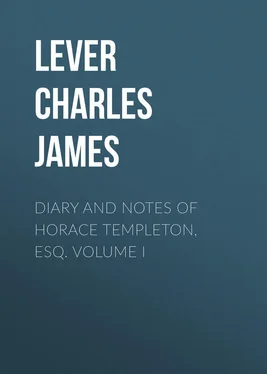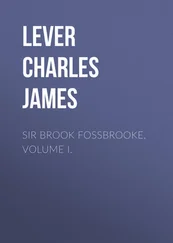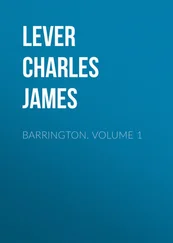Charles Lever - Diary And Notes Of Horace Templeton, Esq. Volume I
Здесь есть возможность читать онлайн «Charles Lever - Diary And Notes Of Horace Templeton, Esq. Volume I» — ознакомительный отрывок электронной книги совершенно бесплатно, а после прочтения отрывка купить полную версию. В некоторых случаях можно слушать аудио, скачать через торрент в формате fb2 и присутствует краткое содержание. Жанр: literature_19, foreign_antique, foreign_prose, на английском языке. Описание произведения, (предисловие) а так же отзывы посетителей доступны на портале библиотеки ЛибКат.
- Название:Diary And Notes Of Horace Templeton, Esq. Volume I
- Автор:
- Жанр:
- Год:неизвестен
- ISBN:нет данных
- Рейтинг книги:4 / 5. Голосов: 1
-
Избранное:Добавить в избранное
- Отзывы:
-
Ваша оценка:
- 80
- 1
- 2
- 3
- 4
- 5
Diary And Notes Of Horace Templeton, Esq. Volume I: краткое содержание, описание и аннотация
Предлагаем к чтению аннотацию, описание, краткое содержание или предисловие (зависит от того, что написал сам автор книги «Diary And Notes Of Horace Templeton, Esq. Volume I»). Если вы не нашли необходимую информацию о книге — напишите в комментариях, мы постараемся отыскать её.
Diary And Notes Of Horace Templeton, Esq. Volume I — читать онлайн ознакомительный отрывок
Ниже представлен текст книги, разбитый по страницам. Система сохранения места последней прочитанной страницы, позволяет с удобством читать онлайн бесплатно книгу «Diary And Notes Of Horace Templeton, Esq. Volume I», без необходимости каждый раз заново искать на чём Вы остановились. Поставьте закладку, и сможете в любой момент перейти на страницу, на которой закончили чтение.
Интервал:
Закладка:
“It would be also a very bold step to refuse the advances of a state that deputes such a mission as this appears to be. Do your despatches from England give any clue by which we may guide our steps in this difficulty? have you heard latterly what are the exact relations existing between England and Ireland? You are aware that his Majesty is at Berlin, and Barring and Von der Decken, who know England so well, are both with him?”
I nodded assent, and, after a second’s silence, a strong temptation to quiz the Minister crossed my mind; and without even a guess at what this mysterious deputation might mean, I gravely hinted that our last accounts from Ireland were of the most serious nature. It was certainly true that kingdom had been conquered by the English and subjected to the crown of England, but there were the most well-founded reasons to fear that the arrangement had not the element of a permanence. The descendant of the ancient sovereigns of the land was a man of bold and energetic and adventurous character; he was a prince of the house of O’Connell, of which, doubtless, his Excellency had heard. There was no saying what events might have occurred to favour his ambitious views, and whether England might not have found the advantage of restoring a troublesome land to its ancient dynasty.
“How does the present mission present itself – how accredited?”
“From the court of Dublin, with the great seal, so far as I can understand the representation, for none of the embassy speak French.”
“That sounds very formal and regular,” said I, with deep gravity.
“So I think it, too,” said his Excellency, who really was impressed by the state-coach of Sheriff Timothy and three footmen in bag-wigs. “At any rate,” said he, “we must decide at once, and there can be no hesitation about the matter. I suppose we must give them an audience of the Crown Prince, and then let all rest till his Majesty returns, which he will do on Friday next.”
Without compromising myself by any assent, I looked as if he had spoken very wisely, and his Excellency departed.
That same afternoon two state-carriages of the court, with servants in dress livery, drew up at the Hof von London, the hôtel where the deputation had taken up their quarters, and a Maréchal de Cour alighted to inform the “Irish ambassador” that his Royal Highness the Crown Prince would receive their homage in the absence of the King. The intimation, more conveyed by pantomime than oral intelligence, was replied to by an equivalent telegraph; but the sheriffs, in all their gala, soon took their places in the carriage and set out for the palace.
Their reception was most flattering; enough to say, they had the honour to address and be replied to by one of the most courteous princes of Europe. An invitation to dinner, the usual civility to a newly arrived mission, ensued, and the Irish embassy, overwhelmed with the brilliant success of their journey, returned to the hôtel in a state of exaltation that bordered on ecstasy.
Their corporation address, formidable by its portentous parchment and official seal, had puzzled the Foreign Office in no ordinary way, and was actually under their weighty consideration the following day, when the King most unexpectedly made his entreé into the capital. King Ernest heard with some amazement, not unmingled by disbelief, that an Irish diplomatic body had actually arrived at his court, and immediately demanded to see their credentials. There is no need to recount the terrible outbreak of temper which his Majesty displayed on discovering the mistake of his ministers. The chances are, indeed, that, had he called himself Pacha instead of King, he would have sentenced the Irish ambassador and his whole following to be hanged like onions on the one string. As it was, he could scarcely control his passion; and whatever the triumphant pleasures of the day before, when a dinner-card for the palace was conveyed by an aide-de-camp to the hotel, the “second Epistle to Timothy” was a very awful contrast to its predecessor. The hapless deputation, however, got leave to return unmolested, and betook themselves to their homeward journey, the chief of the mission by no means so well satisfied of his success in the part of the “Irish Ambassador.”
Now to dress for dinner. I wish I had said “No” to this same invitation.
Nothing is pleasanter when one is in health and spirits than a petit diner ; nothing is more distressing when one is weak, low, and dejected. At a large party there is always a means of lying perdu , and neither taking any share in the cookery or the conversation. At a small table one must eat, drink, and be merry, though the plat be your doom and the talk be your destruction. There is no help for it; there is no playing “supernumerary” in farce with four characters.
Is it yet too late to send an apology? – it still wants a quarter of six, and six is the hour. I really cannot endure the fatigue and the exhaustion.
Holland, besides, told me that any excitement would be prejudicial. Here goes, then, for my excuse… So! I’m glad I’ve done it. I feel myself once more free to lie at ease on this ottoman and dream away the hours undisturbed.
“Holloa! what’s this, Legrelle?” “De la part de Madame la Comtesse, sir. How provoking! – how monstrously provoking! She writes me, ‘You really must come. I will not order dinner till I see you. – Yours, &c. B. de F – .’ What a bore! and what an absurd way to incur an attack of illness! There’s nothing for it, however, but submission; and to-morrow, if I’m able, I’ll leave Paris.
“Legrelle, don’t forget to order horses for tomorrow at twelve.”
“What route does monsieur take?”
“Avignon – no, Strasbourg – Couilly, I think, is the first post. I should like to see Munich once more, or, at least, its gallery. The city is a poor thing, worthy of its people, and, I was going to say – no matter what! Germany, in any case, for the summer, as I am sentenced to die in Italy. I feel I am taking what the Irish call ‘a long day’ in not crossing the Alps till late in autumn!”
How many places there are which one has been near enough to have visited and somehow always neglected to see! and what a longing, craving wish to behold them comes over the heart at such a time as this? What, then, is “this time,” that I speak it thus?
How late it is! De Vigny was very agreeable, combining in his manner a great deal of the refinement of a highly cultivated mind, with the shrewd perception of a keen observer of the world. He is a Légitimiste , I take it, without any hope of his party. This, after all, is the sad political creed of all who adhere to the “elder branch.” Their devotion is indeed great, for it wars against conviction. But where can an honest man find footing in France nowadays? Has not Louis Philippe violated in succession every pledge by which he had bound himself? Can such an example of falsehood so highly placed be without its influence on the nation? Can men cry “Shame!” on the Minister, when they witness the turpitude of the Monarch?
But what hope does any other party offer? – None. Henri Cinque, a Bourbon of the vieille roche , gentle, soft-hearted, sensual, and selfish, who, if he returned to France to-morrow, would never believe that the long interval since the Three Days had been any thing but an accident; and would not bring himself to credit the possibility that the succession had been ever endangered.
I believe, after all, one should be as lenient in their judgment of men’s change of fealty in France as they are indulgent to the capricious fancies of a spoiled beauty. The nation, like a coquette, had every thing its own way. The cold austerities of principle had yielded to the changeful fortunes of success for so many years, that men very naturally began to feel that instability and uncertainty were the normal state of things, and that to hold fast one set of opinions was like casting anchor in a stream when we desired to be carried along by the current. Who are they who have risen in France since the time of the Great Revolution? Are they the consistent politicians, the men of one unvarying, unaltered faith? or are they the expediency makers, the men of emergencies and crises, yielding, as they would phrase it, to “the enlightened temper of the times” – the Talleyrands, the Soults, the Guizots of the day? – not to speak of one higher than them all, but not more conspicuous for his elevation than for the subserviency that has placed him there.
Читать дальшеИнтервал:
Закладка:
Похожие книги на «Diary And Notes Of Horace Templeton, Esq. Volume I»
Представляем Вашему вниманию похожие книги на «Diary And Notes Of Horace Templeton, Esq. Volume I» списком для выбора. Мы отобрали схожую по названию и смыслу литературу в надежде предоставить читателям больше вариантов отыскать новые, интересные, ещё непрочитанные произведения.
Обсуждение, отзывы о книге «Diary And Notes Of Horace Templeton, Esq. Volume I» и просто собственные мнения читателей. Оставьте ваши комментарии, напишите, что Вы думаете о произведении, его смысле или главных героях. Укажите что конкретно понравилось, а что нет, и почему Вы так считаете.












